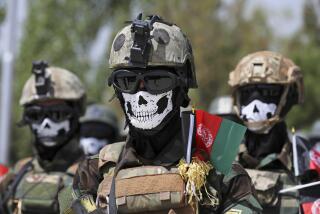News Background : Soviet Move Into Afghanistan: Coup Upon Marxist Coup
- Share via
On Dec. 25, 1979, Soviet aircraft began lifting thousands of Red Army troops into Afghanistan as a coup, reportedly engineered by Moscow, overthrew the Afghan government.
President Hafizullah Amin, who had himself ousted a previous Marxist regime only three months earlier, was executed for “crimes against the state” and replaced by Babrak Karmal, a longtime Amin rival who had been living in exile in Czechoslovakia.
Moscow had supported the Amin government but grew dissatisfied with his ineffective efforts to put down the continuing Muslim rebellion. The Soviet troops, Moscow said, were in Afghanistan at the invitation of the Afghan government to help combat “external enemies.”
Almost six years later, the Soviet troops are still in Afghanistan and the estimated 30,000 that went in at the outset have grown, by Western estimates, to perhaps 118,000.
The Soviet forces have struck hard at the rebels and at villages thought to be providing supplies and shelter for them. Great numbers of Afghans have fled to neighboring countries; as many as 3.5 million are believed to be in Pakistan and Iran.
Yet, the rebels still control much of rural Afghanistan and continue to attack Afghan and Soviet targets, often in the heart of Kabul, the capital. Over the years, the United States has provided the rebels with millions of dollars in aid, much of it covert.
What the fighting has cost the Soviets is not known outside the Kremlin. Clearly, though, the price has been high, and not only in terms of rubles. Soviet casualties have been estimated in the thousands.
Washington has accused the Soviets of using chemical weapons in Afghanistan, even though the Soviets have ratified two treaties that outlaw the use of such weapons. This has not improved Moscow’s standing in the Islamic world.
Repeatedly, the U.N. General Assembly has called for a peaceful settlement of the Afghan question, based on the withdrawal of Soviet troops, restoration of the country’s independent and nonaligned status, self-determination for the Afghan people and the safe return of all refugees.
As the war in Afghanistan has worn on, it has been referred to increasingly as Moscow’s Vietnam. Many analysts say that the Soviets can neither win a decisive victory nor be decisively defeated.
More to Read
Sign up for Essential California
The most important California stories and recommendations in your inbox every morning.
You may occasionally receive promotional content from the Los Angeles Times.












